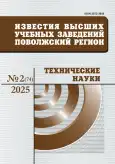Predicting the level of nonconformities (defects) in printed circuit board production based on their calculated reliability
- Authors: Troshin A.A.1, Balakhonova I.V.2
-
Affiliations:
- JSC “PO “Electropribor”
- Penza State University
- Issue: No 2 (2025)
- Pages: 77-88
- Section: ELECTRONICS, MEASURING EQUIPMENT AND RADIO ENGINEERING
- URL: https://journal-vniispk.ru/2072-3059/article/view/308013
- DOI: https://doi.org/10.21685/2072-3059-2025-2-7
- ID: 308013
Cite item
Full Text
Abstract
Background. Improving the reliability of printed circuit boards is associated with reducing the level of their defects in the production process. The task of forecasting the level of defects is especially relevant in a situation where an enterprise enters the so-called inflection point, where the existing technological level fails to ensure acceptable indicators of defects for the increasing volume of production of products of new complexity (for example, when changing the specialization of contract production of printed circuit boards from accuracy class 5 to accuracy class 6 and higher). Early determination of the level of future defects allows developing and implementing measures to reduce production costs. The purpose of the study is to develop a formula for forecasting defects in the production of printed circuit boards. Materials and methods. The following are used to solve the problem: the method of mathematical modeling, methods of reliability theory. Results. A formula for calculating the level of defects in the production of printed circuit boards has been developed, and the critical value of this level has been predicted for the "point" implementation of an enhanced quality control procedure within a specific printed circuit board. Conclusions. The calculation formula has been tested. The results of the test are demonstrated using a specific multilayer printed circuit board as an example. It is planned to conduct an extended test at a printed circuit board manufacturer.
About the authors
Aleksey A. Troshin
JSC “PO “Electropribor”
Author for correspondence.
Email: mail@electropribor-penza.ru
General director
(69 Pobedy avenue, Penza, Russia)Irina V. Balakhonova
Penza State University
Email: i.v.balachonova@mail.ru
Candidate of economic sciences, associate professor, associate professor of the sub-department of instrument engineering
(40 Krasnaya street, Penza, Russia)References
- Verner V., Kuznetsov E., Saurov A. Moore’s law at 50: end or change? Nanoindustriya = Nanoindustry. 2015;(6):50‒62. (In Russ.)
- Dorsch J. The End of Scaling? Available at: http://electroiq/com/mysemicondaily/2014/07/09/
- Martin B. Are We At an Inflection Point with Silicon Scaling and Homogeneous ICs? Available at: http://semimd.com/blog/2014/10/15/
- Astakhov V.P. Osnovy nadezhnosti elektronno-opticheskikh priborov = Fundamentals of reliability of electronic-optical devices. Moscow: MGUPI, 2007:62. (In Russ.)
- Gormakov A.N., Voronina N.A. Konstruirovanie i tekhnologiya elektronnykh ustroystv priborov. Pechatnye platy: ucheb. posobie = Design and technology of electronic devices and instruments. Printed circuit boards: textbook. Tomsk: Izd-vo TPU, 2006:164. (In Russ.)
- Chiminev A. Printed circuit boards are a key component that determines the reliability of the final product. Elektronika: Nauka, Tekhnologiya, Biznes = Electronics: science, technology, business. 2020;(6):42‒46. (In Russ.)
- Troshin A.A., Balakhonova I.V. Improving the mathematical model for predicting printed circuit board failures. Izvestiya vysshikh uchebnykh zavedeniy. Po-volzhskiy region. Tekhnicheskie nauki = University proceedings. Volga region. Engineering sciences. 2024;(4):19–29. (In Russ.)
- Shneydmiller V.R. Defects and analysis of printed circuit boards. Aktual'nye problemy radioelektroniki i telekommunikatsiy: materialy Vseros. nauch.-tekhn. konf. (g. Samara, 15–17 maya 2018 g.) = Current issues in radio electronics and telecommunications: proceedings of the All-Russian scientific and engineering conference (Samara, May 15–17, 2018). Samara: Ofort, 2018:176–177. (In Russ.)
Supplementary files























